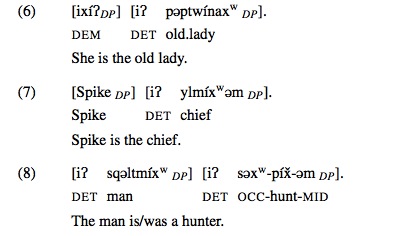|
Equative Sentence
An equative (or equational) sentence is a sentence where two entities are equated with each other. For example, the sentence ''Susan Copular verb#English, is our president'', equates two entities "Susan" and "our president". In English, equatives are typically expressed using a Copula (linguistics), copular verb such as "be", although this is not the only use of this verb. Equative sentences can be contrasted with Predicate (grammar), predicative sentences where one entity is identified as a Set membership, member of a set, such as ''Susan is a president.'' This view has been contrasted by Otto Jespersen in the first part of the XX century and by Giuseppe Longobardi and Andrea Moro in the second. In particular, Andrea Moro in 1988 proved that either demonstrative phrases (DP) must be non referential in the sense of Geach (1962) by exploiting arguments based on binding theory. The idea is that when a DP plays the role of predicate it enlarges its binding domain: for example, in ''Jo ... [...More Info...] [...Related Items...] OR: [Wikipedia] [Google] [Baidu] |
Copular Verb
In linguistics, a copula (; : copulas or copulae; abbreviated ) is a word or phrase that links the subject of a sentence to a subject complement, such as the word ''is'' in the sentence "The sky is blue" or the phrase ''was not being'' in the sentence "It was not being cooperative." The word ''copula'' derives from the Latin noun for a "link" or "tie" that connects two different things. A copula is often a verb or a verb-like word, though this is not universally the case. A verb that is a copula is sometimes called a copulative or copular verb. In English primary education grammar courses, a copula is often called a linking verb. In other languages, copulas show more resemblances to pronouns, as in Classical Chinese and Guarani, or may take the form of suffixes attached to a noun, as in Korean, Beja, and Inuit languages. Most languages have one main copula (in English, the verb "to be"), although some (such as Spanish, Portuguese and Thai) have more than one, while oth ... [...More Info...] [...Related Items...] OR: [Wikipedia] [Google] [Baidu] |

